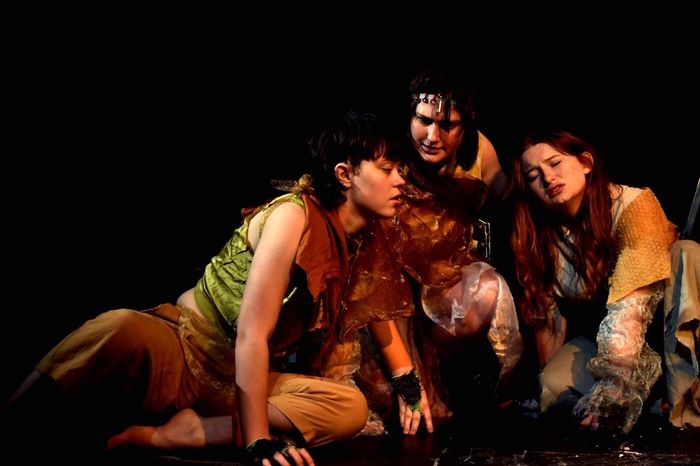A timeless take on ‘Miss Julie’, but not to its benefit
A lack of temporal specificity confuses and detracts from the play’s central relationship

Miss Julie, originally written by August Strindberg, is a play often remembered for its historic controversy due to its frank portrayal of, and focus on, a sexual encounter between the daughter of a count and his ambitious valet. This critical element remains unclear in Kaya Davis’ production, which sits outside any particular epoch and focuses more on a timeless story of two people’s untamed attraction to each other. While the production was an emotionally and psychologically immersive experience throughout, partly due to the intimate performance space of Pembroke New Cellars, it was not clear where this experience rested in time.
“The play’s searing tension is rendered incomprehensible due to the undefined setting”
Davis’ choice to use Helen Cooper’s adaptation made the dialogue seem rooted in the 19th century; a time of rigid social boundaries where sexual relationships were extremely taboo. Strindberg’s crucial comment on societal expectations is lost in an attempt to bring modern relevance to the play — dream-like sequences of drunken parties and dancing disrupt otherwise heart-wrenching moments where two characters struggle to express their desires given the social context of the 1880s. The play’s searing tension is rendered incomprehensible due to the undefined setting, losing any grit due to its unclear commitment to the original context.
Costume design that may have helped clarify instead adds to the confusion. Miss Julie’s modern green and brown dress clashed with Jean’s period dress, emphasising an overall incongruent and disjointed feeling, as if the characters were somewhere between the 19th and 21st century. This timeless feeling means the relationship between Jean and Miss Julie no longer holds as much gravitas, causing the audience to lose sympathy for their struggle.
The musical interludes did not always distract from the plot — they were at times illuminating. We see a pensive sequence in which Christine (Gwynn Horbury) fiddles with various set pieces and dances a waltz; communicating her longing for Jean and desire to be included much more than the text allows her to express. This was a much needed insight into a character otherwise sidelined, and Horbury’s performance was captivating and self-assured. Choreographer Nathaniel Gunn manages to pay homage to the original period, with country folk dance mixed in with the otherwise drunken party movement.
What is lost through the unspecified setting are the societal conventions that bind and entrap the relationship at the heart of the play. This makes the rarely variable plot point of their confused relationship repetitive, all the arguing between Miss Julie (Lucy Miller) and Jean (Xander Pang) feels like the play is frustratingly running in circles around two narcissists unable to express their feelings plainly for one another, which makes any sympathy extremely hard to summon. However, successful portrayals of two characters grappling with pride and attraction meant one felt as if they were within a study of human psychology.
Miller and Pang’s interactions created a thoroughly captivating and palpable sexual tension. Davis’ staging also successfully played with the confused power dynamic between the two, with moments of intensity and challenge woven into more vulnerable, and even manipulative scenes. This created an emotionally immersive experience where audiences are also frustrated at Miss Julie and Jean’s temperamental nature. Miller and Pang oscillated easily among their character’s many facets; Miller’s portrayal of coy, self-entitled, unsteady Miss Julie was a particularly skillful performance.
The set was simple and in keeping with the original period, yet entirely functional with every item revealing its purpose in the play. This was complemented by a creative use of backlighting and shadows, which revealed non-textual aspects of the narrative; a particularly poignant moment was at the very end, where the shadow of a bell appeared, indicating the Count’s presence and his invasion of the space - a credit to lighting designer Edward De’Ath.
This production of Miss Julie interestingly experiments with a classic, but in doing so, loses the full significance of an exploration into a sexual relationship that crosses class lines due to Davis’ endeavour to give it modern day relevance. However, thanks to the three principal actors never losing focus of their character’s motivations and psyche, the production is nonetheless a thoroughly engaging watch.
Miss Julie is playing at the Pembroke New Cellars from Tuesday 7th to Saturday 11th February, 7pm.
 News / Eight Cambridge researchers awarded €17m in ERC research grants27 December 2025
News / Eight Cambridge researchers awarded €17m in ERC research grants27 December 2025 News / News in Brief: carols, card games, and canine calamities28 December 2025
News / News in Brief: carols, card games, and canine calamities28 December 2025 News / Downing investigates ‘mysterious’ underground burial vault 29 December 2025
News / Downing investigates ‘mysterious’ underground burial vault 29 December 2025 Interviews / Meet Juan Michel, Cambridge’s multilingual musician29 December 2025
Interviews / Meet Juan Michel, Cambridge’s multilingual musician29 December 2025 Sport / Hard work, heartbreak and hope: international gymnast Maddie Marshall’s journey 29 December 2025
Sport / Hard work, heartbreak and hope: international gymnast Maddie Marshall’s journey 29 December 2025







